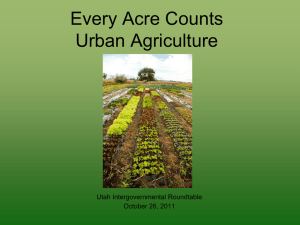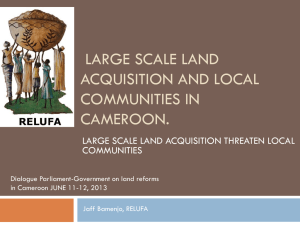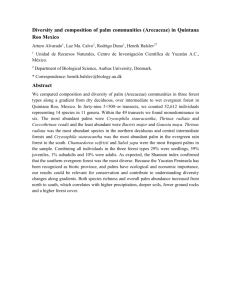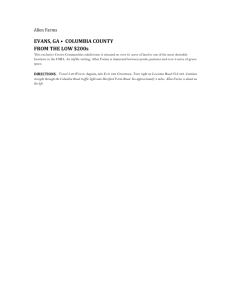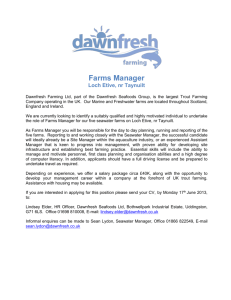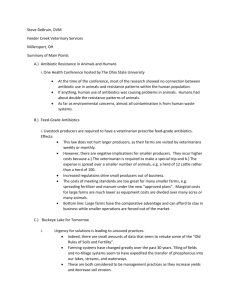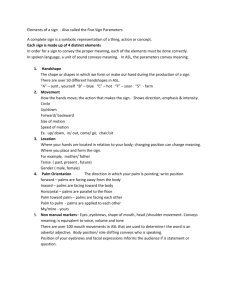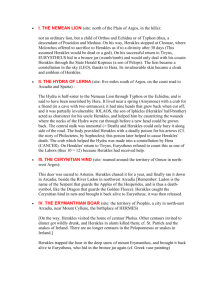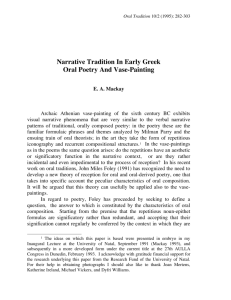Grace`s Annotation TEN
advertisement
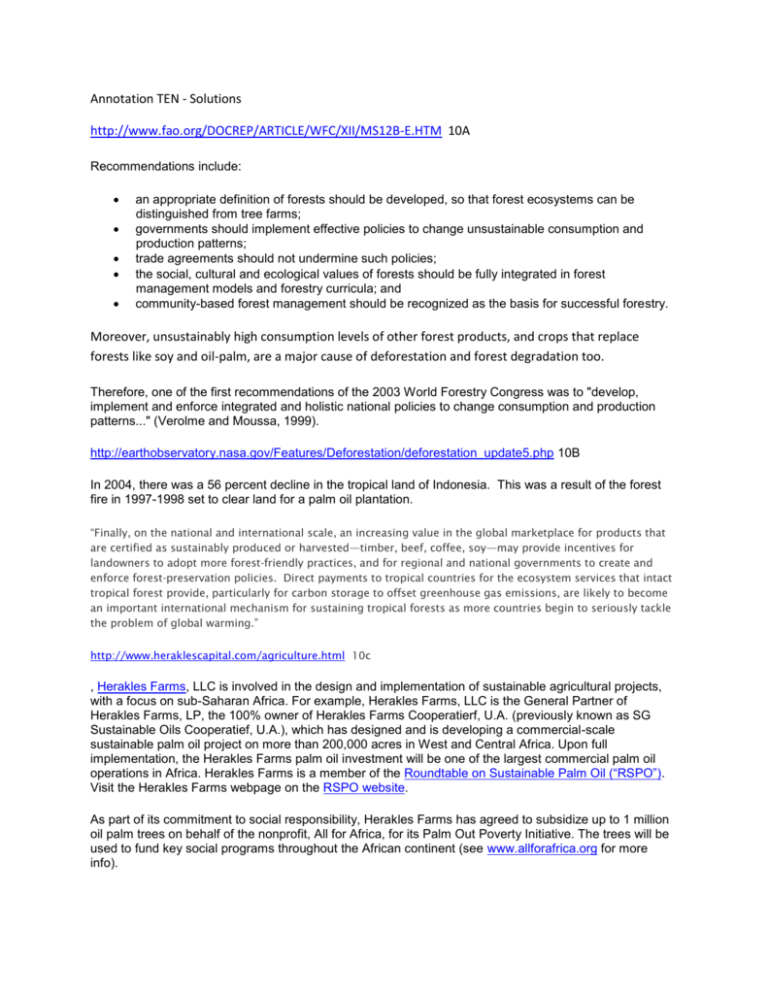
Annotation TEN - Solutions http://www.fao.org/DOCREP/ARTICLE/WFC/XII/MS12B-E.HTM 10A Recommendations include: an appropriate definition of forests should be developed, so that forest ecosystems can be distinguished from tree farms; governments should implement effective policies to change unsustainable consumption and production patterns; trade agreements should not undermine such policies; the social, cultural and ecological values of forests should be fully integrated in forest management models and forestry curricula; and community-based forest management should be recognized as the basis for successful forestry. Moreover, unsustainably high consumption levels of other forest products, and crops that replace forests like soy and oil-palm, are a major cause of deforestation and forest degradation too. Therefore, one of the first recommendations of the 2003 World Forestry Congress was to "develop, implement and enforce integrated and holistic national policies to change consumption and production patterns..." (Verolme and Moussa, 1999). http://earthobservatory.nasa.gov/Features/Deforestation/deforestation_update5.php 10B In 2004, there was a 56 percent decline in the tropical land of Indonesia. This was a result of the forest fire in 1997-1998 set to clear land for a palm oil plantation. “Finally, on the national and international scale, an increasing value in the global marketplace for products that are certified as sustainably produced or harvested—timber, beef, coffee, soy—may provide incentives for landowners to adopt more forest-friendly practices, and for regional and national governments to create and enforce forest-preservation policies. Direct payments to tropical countries for the ecosystem services that intact tropical forest provide, particularly for carbon storage to offset greenhouse gas emissions, are likely to become an important international mechanism for sustaining tropical forests as more countries begin to seriously tackle the problem of global warming.” http://www.heraklescapital.com/agriculture.html 10c , Herakles Farms, LLC is involved in the design and implementation of sustainable agricultural projects, with a focus on sub-Saharan Africa. For example, Herakles Farms, LLC is the General Partner of Herakles Farms, LP, the 100% owner of Herakles Farms Cooperatierf, U.A. (previously known as SG Sustainable Oils Cooperatief, U.A.), which has designed and is developing a commercial-scale sustainable palm oil project on more than 200,000 acres in West and Central Africa. Upon full implementation, the Herakles Farms palm oil investment will be one of the largest commercial palm oil operations in Africa. Herakles Farms is a member of the Roundtable on Sustainable Palm Oil (“RSPO”). Visit the Herakles Farms webpage on the RSPO website. As part of its commitment to social responsibility, Herakles Farms has agreed to subsidize up to 1 million oil palm trees on behalf of the nonprofit, All for Africa, for its Palm Out Poverty Initiative. The trees will be used to fund key social programs throughout the African continent (see www.allforafrica.org for more info). Herakles Capital believes that large-scale investment provides the most rapid path to job growth in subSaharan Africa. It seeks projects that meet growing demand for food and commercial agricultural projects that can be implemented in a sustainable and environmentally benign manner with full support of the local people. http://www.heraklescapital.com/docs/PressRelease_%206_%2015_2011.pdf 10d From Press Release about this farm. “We are very excited to be developing one of the largest sustainable palm oil plantations in Africa, establishing an African stake in one of the fastest-growing global food crops. The need for local supply is significant. In 2009, Africa imported approximately 4 million tons of palm oil, primarily from Indonesia and Malaysia. Currently, the continent's average per capita consumption of oils and fats is only about 11 kg, compared to the world average of about 24 kg,” said Bruce Wrobel, CEO of Herakles Farms. “In addition to reducing dependence on imports for this food staple, the plantations will deliver a whole range of benefits for the local population, including jobs, housing, health clinics, clean water and schools, while safeguarding the incredible biodiversity of this part of the world.” No planting on primary forest or high conservation value forest (HCVF) will be done, and buffer zones between the plantations and those regions will be maintained. Herakles Farms is engaging with the local communities throughout the planning and development process. The project will not require any local villages to move from their land, and strategies to assist local farmers in best practices for resource efficiency and yield enhancement are being planned. The investment in the two plantations is following a several-year evaluation process, which has included environmental impact assessments focusing on wildlife and plantlife by local and international organizations, as well as assessments of criteria such as climate, infrastructure, and the quality of local governance. Global demand for palm oil is rising rapidly with population growth. Consumption increased by 50% in the five year period from 2004 to 2009. Palm oil has the benefit of the highest yield per hectare among vegetable oil-yielding crops, meaning that less land is required for production, while it also requires comparatively lower amounts of inputs such as fertilizer, fuel and pesticides. The World Bank notes that, "with a population increase of 11.6 percent and a 5 percent increase in per capita consumption, an additional 28 million tonnes of vegetable oils will have to be produced annually by 2020. Palm oil is well placed to meet this demand with the lowest requirement for new land." Large oil palm plantations also generate more employment per unit area than most other large scale farming, such as soybeans. About Herakles Farms Established in 2009, Herakles Farms is focused on large-scale agricultural projects in Africa. The management team has a proven track record developing environmentally and socially responsible projects that provide economic development in some of the least-developed African countries, and has received numerous awards for its work. Herakles Farms is an active member of the Roundtable on Sustainable Palm Oil (RSPO). Herakles Farms is partnered with the nonprofit, All for Africa, which funds projects focused on agriculture, clean water, community health, education, energy, environmental impact, micro-financing and skills training/livelihood creation. http://www.fitsugar.com/Ditching-Trans-Fat-Benefits-Exceed-Cost-112836 10e We're all excited about about how many cities, states and companies are banning trans fats, but how are they going to deliver the same beloved French Fries and fried chicken that so many of their customers crave? This Chicago restaurant owner, Ina Pinkney, might have paved the way - she eliminated trans fat from her menu a few years ago, and made the switch to Canola oil. She says that going trans fat free was a recipe for success. She feared that the partially hydrogenated vegetable oils used in her foods were endangering her customers' health. Using Canola oil is not only healthier for her customers, but it's cheaper for her - she says it cooks so much better, so she uses less oil. The oil's "fry life" and taste are virtually the same, but Canola oil is about 30% more expensive than partially hydrogenated vegetable oil. That's why a lot of restaurant owners are reluctant to make the switch. They just need to talk to Ina since she thinks it is cost beneficial. But in the end switching over to Canola oil will prove beneficial because if patrons know the food is healthier, they'll probably be eating it more often (and MORE of it). 10F http://www.saynotopalmoil.com/palm-oil.php#ProductLists
